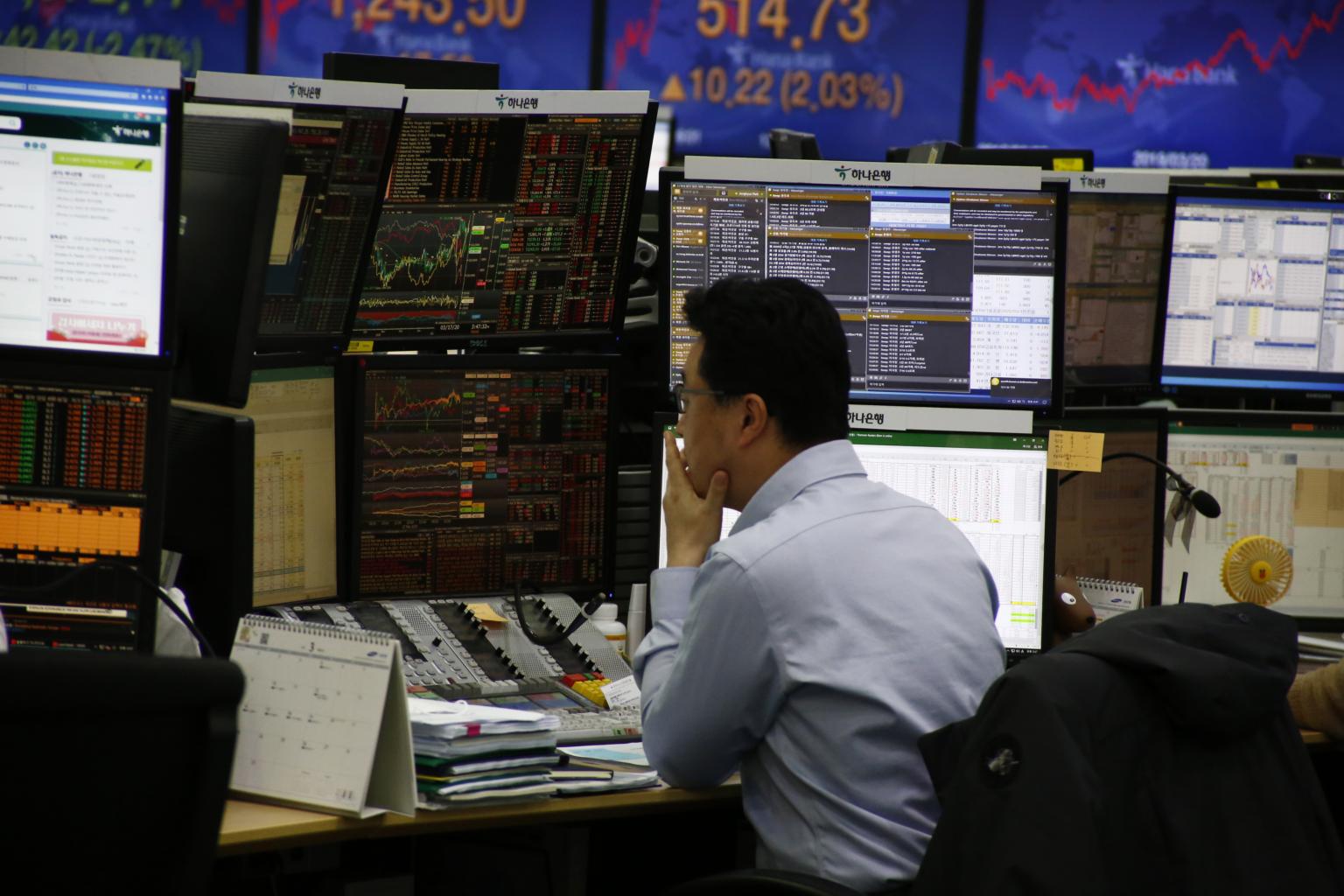How complex structured products sold in South Korea could roil global markets
Sign up now: Get ST's newsletters delivered to your inbox

Korea's Kospi 200 index of shares sank by as much as 9.1 per cent on Thursday.
PHOTO: EPA-EFE
SEOUL (BLOOMBERG) - South Korea's US$84 billion (S$122 billion) market for complex structured products is coming under strain as global stocks and commodities tumble, threatening to saddle securities firms with losses and worsen volatility in everything from local corporate bonds to offshore derivatives.
Packaged by Korean and global financial firms and sold primarily to individual investors, the products are designed to deliver bond-like coupons with exposure to upside in things like equities and crude oil.
But as markets sink around the world on coronavirus fears, it's becoming increasingly complicated and expensive for the firms that package the products to hedge their risks. Some are facing margin calls on their offshore derivatives positions and scrambling to sell assets - including Korean corporate bonds - to meet their obligations, according to Lee Hyo Seob, research fellow at the Korea Capital Market Institute.
"Korean brokerages are panicking," Lee said on Thursday (March 19), as the nation's Kospi 200 index of shares sank by as much as 9.1 per cent. The gauge, down about 30 per cent from a high in January, is among the most-used reference indexes for structured notes.
Regulators in Korea are monitoring the structured product market, Son Young-chae, an official at Financial Services Commission, said by phone.
Securities firms have a long history of getting burned by Korean structured products, also known as "autocallables" and "equity-linked securities." France's Natixis took a 259 million-euro (S$401 million) hit at the end of 2018 because of what it described as a "hedging strategy that proved to be deficient."
In 2010, Barclays lost money on Asian autocallables and changed its processes as a result, according to a person familiar with the matter. Citigroup lost more than US$50 million on them in 2012, prompting a round of internal rancor at the New York-based bank. ING Groep lost a smaller sum around the same time, people familiar with the matter said. In 2015, dealers in the products were burned after Chinese shares traded in Hong Kong plunged.
Despite the risks, sales of Korean structured products have soared in recent years, rising to a record 41.8 trillion won (S$48.2 billion) in the fourth quarter of 2019. Both investors and brokers earn juicy returns from the products when asset prices are rising; it's only when markets plunge that problems start to arise.
Four products tied to a gauge of European bank stocks, for example, could lose half their value at maturity if the measure fails to rebound from a drop of about 50 per cent since mid-February.
A three-year product sold by Korea Investment & Securities offered an 8.7 per cent annual coupon if none of three underlying gauges - West Texas Intermediate oil futures, the Hang Seng China Enterprises Index, and the Euro Stoxx 50 - fall more than 50 per cent from their closing prices on April 18. But with WTI futures down about 64 per cent since then, buyers may face a principal loss of over 25 per cent, according to the terms.
Last year, products linked to German sovereign bonds caused big losses for investors because the benchmark yield fell sharply below zero. In the aftermath, regulators banned local banks from selling some types of products and said they would increase the minimum investment amounts for individuals.
The hit to investors and securities firms this time around will depend on the depth and duration of the global sell-off. But Lee said there are already signs of ripple effects on other markets. The spread on Korea's AA-rated corporate bonds widened to 50 basis points on Thursday, most since November 2017, according to data compiled Bloomberg.
"The firms are dumping their bonds," Lee said. "The problem is issuers are holding many lower-grade corporate bonds, such as those with an A- or BBB ratings, in order to offer high coupons to buyers. Systematic risk is rising."


